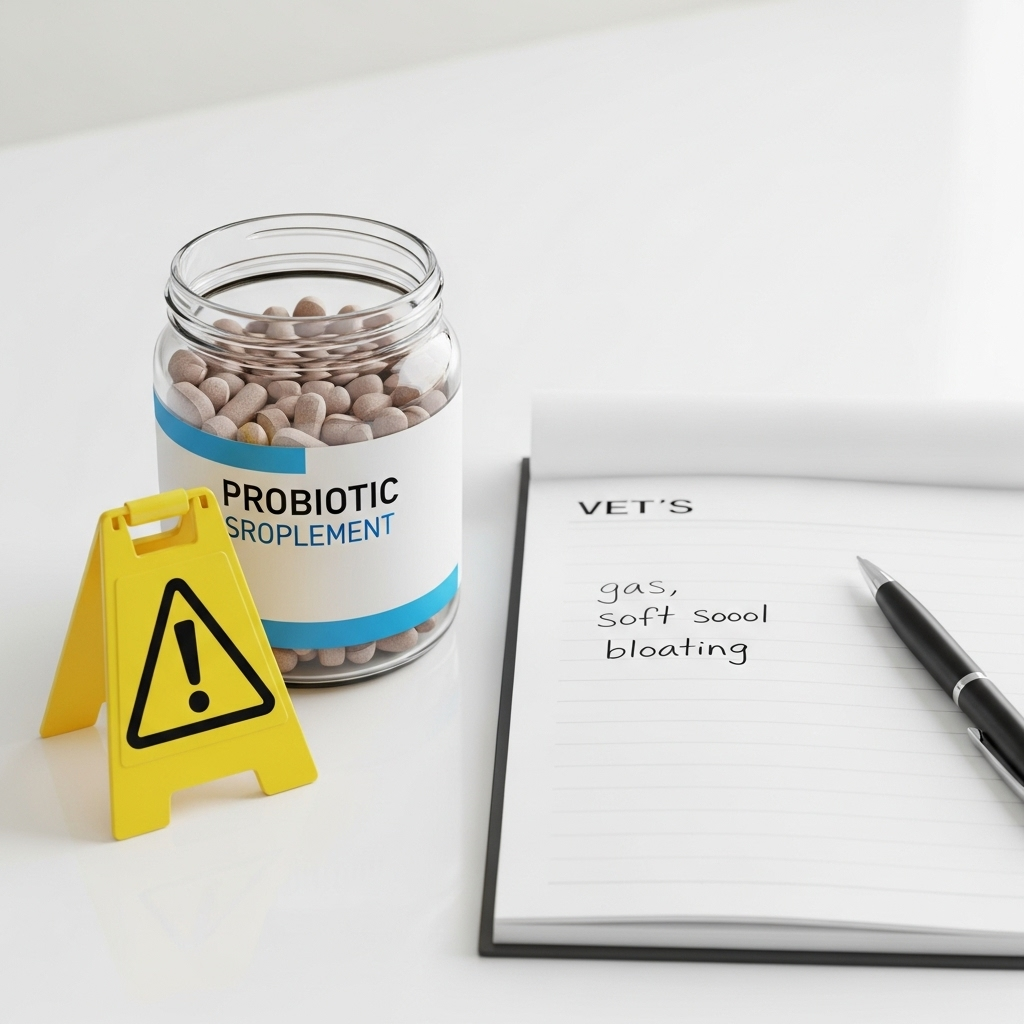Can Pets Overdose on Probiotics? Side Effects Explained

Probiotics are live microorganisms (usually bacteria or yeasts) that can support digestive health in dogs, cats, and other pets. Many owners give probiotics to help with diarrhea, stress-related GI upset, or after antibiotics. It’s reasonable to worry about “too much”—can pets overdose on probiotics, and what side effects should you watch for? This article explains the risks, expected reactions, and practical steps to keep your pet safe.
What are probiotics and why pets get them
Probiotics contain beneficial strains such as Lactobacillus, Bifidobacterium, Enterococcus, and Saccharomyces boulardii. They are formulated for pets as powders, capsules, chews, or as part of therapeutic diets. Common reasons to use them include:
- Short-term diarrhea or stool inconsistency
- Improving gut flora after a course of antibiotics
- Reducing stool odor or improving stool quality
- Supporting digestive health during stress (travel, boarding)
- Chronic GI conditions under veterinary guidance
Can pets overdose on probiotics?
Technically, “overdose” implies a toxic response from an excessive amount of a substance. For most healthy pets, probiotics are not toxic and a single extra dose is unlikely to cause long-term harm. However, giving very large amounts or daily doses far above recommended levels can cause undesirable effects—mainly gastrointestinal—and in rare cases more serious problems.
Why extra doses might cause problems
- High counts of live microbes can temporarily alter gut balance, causing gas, bloating, or diarrhea.
- Some probiotic products contain multiple strains and filler ingredients that may be harder to tolerate in large amounts.
- Pets with weakened immune systems, severe illness, or central venous catheters may be at higher risk of systemic infection from live organisms.
- Probiotics are not regulated like drugs; manufacturing errors or contamination can increase risk if very high doses are used.
Common side effects of too much probiotic
Mild, short-lived side effects are the most common when a pet receives more probiotics than needed:
- Gas and flatulence
- Bloating or mild abdominal discomfort
- Soft stools or mild diarrhea
- Constipation (less common)
- Reduced appetite for a short period
These typically appear within hours to a few days and often resolve once the extra probiotic is discontinued. Supportive care—such as withholding food for a brief period if the pet is vomiting and offering small, bland meals—can help, but contact your veterinarian if symptoms worsen or persist.
Rare but serious risks
Serious complications are uncommon but important to know about:
- Systemic infection (bacteremia or fungemia) has been reported in humans and animals with severely compromised immune systems
- Allergic reactions to ingredients in the product (rare)
- Exacerbation of underlying GI disease if not used appropriately
If your pet is immunocompromised (e.g., on chemotherapy, high-dose steroids, or with advanced illness), discuss probiotic use with your veterinarian before starting them.
How to dose probiotics safely
Follow these steps to reduce the chance of side effects:
- Choose a product formulated for your species (dog, cat, etc.).
- Follow the manufacturer’s or your veterinarian’s recommended dose—dosage is often based on pet weight.
- Start with the lower end of the dosing range for sensitive pets, then increase if needed and tolerated.
- Avoid giving multiple probiotic products at the same time unless your vet advises it.
- If your pet is on antibiotics, many vets recommend waiting a few hours after the antibiotic dose before giving the probiotic to help the probiotic organisms survive.
Special populations
Puppies, kittens, elderly pets, and those with chronic illnesses may need lower starting doses and veterinary supervision. Probiotics are supportive therapy, not a replacement for veterinary diagnosis and treatment of serious GI issues.
Signs your pet may have received too much
- New or worsened vomiting
- Persistent diarrhea or very loose stools beyond 48–72 hours
- Abdominal pain, bloating, or distension
- Marked lethargy, fever, or signs of systemic illness
- Sudden refusal to eat with other concerning signs
If you observe these signs, stop the probiotic and contact your veterinarian. For severe symptoms such as collapse, severe dehydration, high fever, or difficulty breathing, seek emergency veterinary care immediately.
| Pros | Cons |
|---|---|
| Can reduce diarrhea and support recovery after antibiotics | Mild GI upset if dose is too high (gas, bloating, diarrhea) |
| May improve stool quality and odor | Rare risk of systemic infection in immunocompromised pets |
| Easy to administer in species-specific formulations | Product variability and lack of strict regulation |
What to do if you think your pet had an overdose
- Stop giving the probiotic immediately.
- Observe your pet for 24–72 hours for improvement in symptoms.
- If symptoms are mild (transient gas or soft stools), offer small amounts of bland food and fresh water and monitor closely.
- Contact your veterinarian if symptoms persist, worsen, or if your pet shows signs of systemic illness (fever, lethargy, collapse).
- If your pet is immunocompromised or has an implanted medical device, call your vet promptly even for mild symptoms.
Choosing a probiotic product
When selecting a probiotic for your pet, consider:
- Species-specific formulation and dosing instructions
- Clear labeling of strains and colony-forming units (CFU) at the time of manufacture
- Reputable manufacturer with quality control and stability data
- Products recommended or prescribed by your veterinarian for specific conditions
FAQ
1. Can giving too many probiotics kill my pet?
No—probiotics are not typically toxic in the way some medications or toxins are. However, very large amounts can cause troublesome GI upset and, in rare cases (especially in immunocompromised animals), serious infection. Always follow dosing instructions and consult your vet for high-risk pets.
2. Are human probiotics safe for dogs and cats?
Some human probiotics are tolerated by pets but they may contain strains or doses not ideal for animals. Pet-specific products are formulated with suitable strains and dosing. Ask your vet before using human products long-term.
3. Can probiotics interact with other medications?
Probiotics are generally safe with most medications, but timing with antibiotics matters—give probiotics a few hours after antibiotics to improve survival of the probiotic organisms. Always tell your vet about all supplements and medications your pet receives.
4. How long before I see results?
Some pets show improvement within a few days; others may take 2–4 weeks for noticeable changes. If there is no improvement after a reasonable trial or if symptoms worsen, consult your veterinarian.
Key Takeaways
- Most healthy pets do not “overdose” on probiotics in a toxic sense, but too much can cause GI upset.
- Follow product instructions and consult your veterinarian for dosing—especially for puppies, kittens, elderly, or immunocompromised pets.
- Watch for persistent vomiting, severe diarrhea, fever, or lethargy; seek veterinary care if these occur.
- Use species-specific, quality products and avoid combining multiple formulations without veterinary guidance.
- Probiotics are supportive—work with your veterinarian to treat underlying causes of GI problems.
If you’re ever unsure about dosing or see worrying signs after giving probiotics, call your veterinarian. Early communication prevents small problems from becoming emergencies.
Disclaimer: This article provides general information and is not a substitute for professional veterinary advice. Dosage needs and risks can vary by species, breed, age, and health status. If your pet is ill, pregnant, nursing, or immunocompromised, consult your veterinarian before starting any probiotic or supplement. In emergencies, seek immediate veterinary care.

Leave a Reply